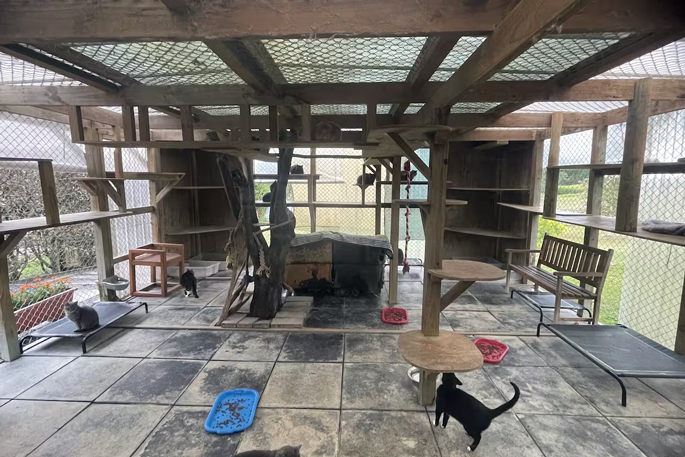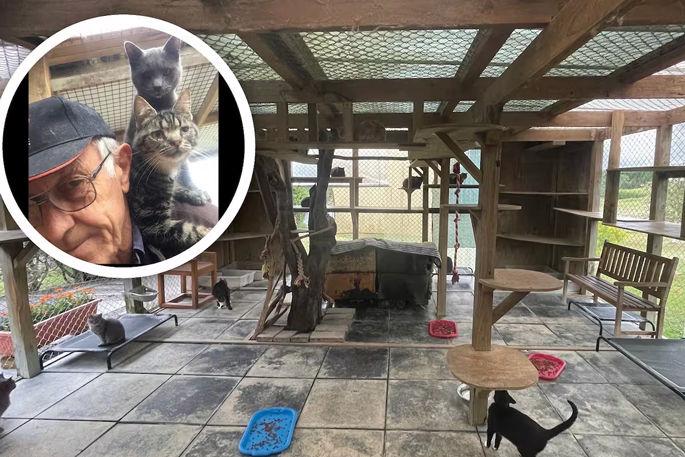“Right, what are we going to do with the cats?”
Along with concern and uncertainty, that was one of Jen Agnew’s first reactions when test results confirmed her father had Stage 3 lung cancer last week.
Tokoroa man Wayne Proffitt, 68, was told by doctors he could begin treatment in about three weeks at the Cancer Society’s Lions Lodge in Hamilton.
With that news, his family were faced with a mission – rehoming 100 of his cats in less than three weeks.
“He could be called up for treatment any day,” Agnew said.
Wayne’s wife, Karen Proffitt, plans to stay by his side while he receives treatment in Hamilton, just over an hour away.
This would mean family members in Tokoroa could not care for the cats at the semi-rural property, Agnew said.
Wayne and Karen were scheduled to stay in Hamilton from Monday to Friday during his treatment, she said.
Her son, 14, also commuted to Rotorua with them every day to attend Western Heights High School. Agnew, 42, works full-time in Rotorua and so does her wife, Daina Agnew.
“You’re looking at two hours in the morning and two hours at night for feeding and cleaning,” she said.
And the cost: “About $60,000 a year, We were buying big 700kg bulk bags of kitty litter, the biggest bag of biscuits you can find, just bulk everything.”
Wayne had the cats desexed to prevent more from being born, “as soon as they arrived”.
 When Wayne Proffitt closed his business and retired last year, he built a second enclosure for his cats at home in Tokoroa.
When Wayne Proffitt closed his business and retired last year, he built a second enclosure for his cats at home in Tokoroa.
‘Soft spot for cats’
The cats started showing up at her father’s business, Surface Coatings, in Browning St, Tokoroa.
At first, there were 17 cats. That was 20 years ago.
“Then the population just grew,” said Agnew, who worked as a payroll administrator in the business in her 20s.
“It’s just industrial areas, you’ve got cats hanging around and then obviously when you start feeding them, more show up.”
Over the years, the family noticed “dumpings” of kittens at their business. “We’ll see cats around and think, no, that’s not one of ours, it’s too fluffy.”
When Wayne retired last year, the 70 cats living onsite at his business were moved to a new, purpose-built enclosure at his lifestyle block on the outskirts of Tokoroa. He wanted to keep them separated from the 30 cats already living at the home, Agnew said.
“Those ones are only a little bit younger but, because they’ve been exposed to more illnesses like FIV or cat flu and stuff, we just thought we would keep these ones separated.”
With such a “soft spot for cats”, Wayne had opted out of family holidays and other events over the years.
“He’s sacrificed a lot for the cats.”
‘Dad needs to rest now’
She couldn’t estimate how many cats they’d rehomed during the 20 years, “but I know it’s a lot”.
The family had never charged people when cats were adopted.
“Dad’s done such a good job over the years, but now’s the time that he actually needs to put himself first ... he’s so heartbroken that it’s come to this.
“Even for me, it’s going to be hard. I’ve got three at home that are originally from work.”
Agnew said that, as they worked to rehome the cats this week, Wayne and Karen were still feeding them while at the same time saying goodbye.
“This treatment is supposed to cure but we don’t know what will happen ... or how he’ll respond to the treatment.”
She said helping to make his recovery easier was a way to cope with the possibility of losing her father, she told the Rotorua Daily Post.
Wayne would not be able to focus on getting better if he knew the cats were still at home.
“Anything to make their life easier.”
Facebook post shared widely
A Facebook post from Daina on February 1 has helped the couple rehome 28 cats so far.
“I’m just blown away. I didn’t expect it. I thought maybe we might rehome a couple of cats, but we just didn’t expect it to blow up like this,” Agnew said.
The post has been shared more than 270 times.
The family did not want money from the people who would adopt their cats. All they ask is that they go to a good home.
Agnew said she and her wife would even drop them off if required. They planned to take time off work next week to do it and said they were heading to Hawke’s Bay this weekend to drop some there.
A woman from Waiheke Island had also couriered the family multiple cat cages and planned to meet them in Auckland at the ferry.
“A lot of people have offered to meet us halfway, but our aim is just to drop them off at the door,” Agnew said.
And there were favourites, she said. “There’s little Lulu, man, she’s really popular and she’s got a lot of homes to go to if ... [some] fall through.”
A vet was scheduled to visit their home and euthanise the remaining cats on Tuesday, February 11.
“But if we know we have got others that are rehomeable, we will hang on to them and wait until Friday.”
The cost of euthanasia was about $80 for each cat, Agnew said. She estimated about 40 would be too wild to rehome and would have to be euthanised.
The SPCA was due to pick up as many cats as it could.
“The quiet ones that might need a little bit more time adjusting [to a new home], the SPCA are going to take because they can put time and effort into them and get them ready for their homes,” Agnew said.
SPCA area manager Viv Moore said Wayne’s dedication to caring for cats over the past 20 years was “really kind”.
“The number of cats we can accept into care depends on our current capacity and resources.
“We prioritise animals based on their health, vulnerability and the urgency of their situation.”
In 2024, the SPCA took in 7882 cats and 14,554 kittens. Adoption fees for kittens were $200, and cats were $125. Senior cats, over 10 years, were $90.
“We ensure all animals are healthy and prepared for their new home prior to adoption, with essential things such as desexing, microchipping and vaccinations already done,” Moore said.
The SPCA acknowledged that, in certain circumstances, if there were no other viable options after health and temperament assessments, it might be necessary to euthanise an animal that could not be rehomed. However, that was the last option.
“We are grateful for Wayne and others’ passion and commitment to animal welfare,” Moore said.



0 comments
Leave a Comment
You must be logged in to make a comment.